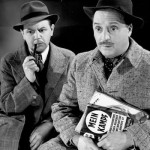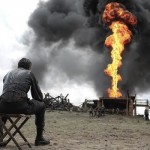Chinatown Review
Chinatown is an undeniable classic from a true master of cinema, Roman Polanski. An important (perhaps the definitive) entry into the “neo-noir†subgenre, the film also marks a turning point in Jack Nicholson’s career and the high point of director Roman Polanski’s. It’s a brilliant film, everything a good noir film should be, but it plays a little with some basic noir conventions. Most obviously, the film is in color. Polanski and screenwriter Robert Towne also take their characters in some surprising directions. And it’s hard to quibble with any decision made by this cast and crew. It’s as close to film perfection as you’ll be able to find.
J.J. Gittes (Jack Nicholson) is an atypical private investigator. He is a gentleman. He apologizes after cursing in front of ladies and does the right thing as often as possible. When a woman identifying herself as Evelyn Mulwray hires him to find out if her husband is cheating, he accepts the assignment without question. It seems as straightforward a job as they come. Her husband, Hollis Mulwray (Darrell Zwerling), is the Los Angeles’ Water Commissioner, and the city is going through a terrible drought, which makes him quite the unpopular man.
Gittes tails Hollis and sees him with another woman. When the photos are leaked to the press, another woman shows up and threatens to sue, for she is the real Evelyn Mulwray (Faye Dunaway), and she’s not happy with what’s been in the papers. After some (strangely) minimal prodding from Gittes, Evelyn agrees to drop the suit, but the detective won’t let up because he wants to find out who set him up. Ultimately, he finds himself in the thick of a much more sinister plot, which may or may not involve Noah Cross (John Huston), Evelyn’s father and former business partner of Hollis’ who is rich and has some secrets to hide.
Of all the things Chinatown does right, its pace is perhaps the most impressive. No plot description can do its complexity justice. It’s really dense (but incredibly interesting) stuff, and Polanski and Towne go to great lengths to make sure you don’t get lost. With a plot this dense, it really is a miracle the running time is only slightly over two hours. The film doesn’t waste a second of that time on anything that isn’t necessary.
Chinatown might also be one of the most superbly written films of all time. The writing is just brilliant. It contains all the hallmarks of film noir (a femme fatale, double crosses, etc.), but Towne tweaks them enough to make them seem fresh. And the characters are fully developed, but their different characteristics are revealed slowly as the plot unfolds. Perhaps a guest writing credit should also be given to Polanski. The ending, which is surprising and also quite dark, was a point of serious contention between the writer and director. Towne wanted a more upbeat finale, but what we see comes from Polanski. I can’t comment on how the film would have been if Towne had the final word, but I can’t complain that Polanski won the argument because what’s in the film is perfect and gives us one of the most iconic lines in cinema history.
The acting is uniformly excellent. Jack Nicholson makes the most out of one of his first chances to singularly headline a film. Gittes is a complex character, much more so than the famous PIs of old film noir. He’s much more honorable, and Nicholson shows it. He’s also not afraid to get his hands dirty—only if necessary. After playing Gittes, Nicholson’s became an undeniable star (not unlike Humphrey Bogart after his film noir classic The Maltese Falcon), but, as great as his career has been, he’s never (at least for my money) matched the work he does in this, also the best film he’s ever appeared in.
His work is equaled by the incomparable Faye Dunaway, one of the best actresses of her generation. This isn’t her best work (her performance in Network is my favorite female performance of all-time), but that shouldn’t diminish what she does here. In all film noirs, it’s important for the femme fatale to keep her hand close to her chest, and Dunaway does just that. We are never quite sure what her motivations are, and the eventual revelation is just as surprising and tragic as the film’s conclusion is.
The film’s other acting standout is John Huston (director of such classic films as The Maltese Falcon and Treasure of the Sierra Madre) as Noah Cross, Evelyn’s frightening father. From the moment we are introduced to this man, we know he will be the film’s villain, and Huston basks in this fact, delivering his lines with relish. He only has a few scenes, but he makes them quite memorable.
Academy members ate up Chinatown, giving it 11 nominations (including Picture, Director, Actor, and Actress), but it faced stiff competition in the form of The Godfather: Part II, which won every the major award it was up for in 1974. Polanski’s film only took home one Oscar, for Towne’s terrific screenplay. But Chinatown has, thankfully, endured. It’s one of the most highly regarded films ever made, and it should be.















